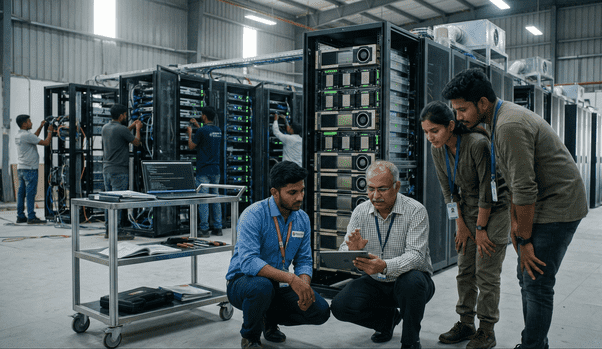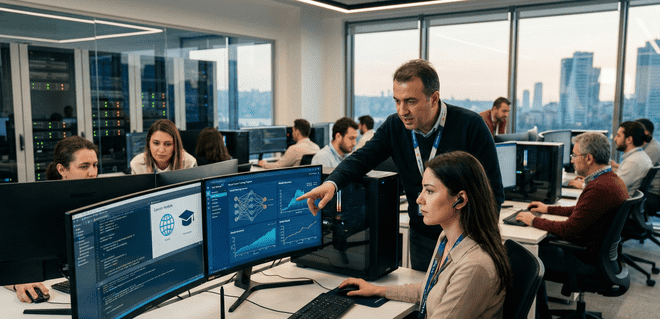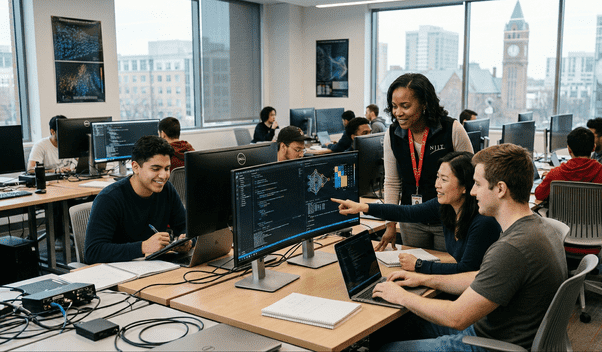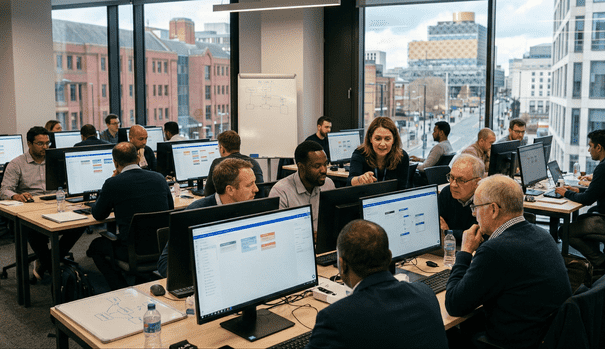How AI Robotics is Shaping the Future of Hospitality
Hotels using AI and robotics are slashing operational costs substantially while delighting guests and boosting revenues. Operational costs have dropped by 30% to 40%. The AI-driven hospitality market is projected to reach $1.46 billion by 2029, growing at a CAGR of 57.8%. Meanwhile, the hospitality robotics sector is expected to expand from $24.38 billion in 2024 to $107.24 billion by 2034.
A Revolution in Cost and Experience
Hospitality is undergoing a radical overhaul powered by artificial intelligence and robotics. Hotels that embrace automation are reporting impressive operational cost reductions of 30-40% coupled with elevated guest satisfaction and smarter revenue generation strategies.
The dual benefits of efficiency and experience transformation are not happening in isolation. They are part of a broader trend in the industry’s evolution from human-centric to tech-powered service ecosystems.
Market Trajectory that Demands Attention
The AI-driven hospitality market’s projected growth to one point forty-six billion dollars by 2029 at a 57.8 percent CAGR signals opportunity and urgency. Even more telling is the broader hospitality robotics sector, forecasted to escalate from twenty-four billion dollars in 2024 to one hundred-seven billion dollars by 2034. (Source)
This exponential trajectory sends a clear message. Professionals and organizations that ignore this wave risk falling behind. The industry is shifting under our feet.
Night Food Holdings: A Blueprint for AI-Driven Hospitality
Night Food Holdings is trailblazing a new operational model by embedding robotics and AI at the heart of hotel operations, not as an add-on but as a foundational element. The company is rolling out guest-facing robots, food runners, and laundry assistants via a Robotics-as-a-Service model while simultaneously owning real estate. This integration generates recurring tech revenue and real estate appreciation as they refine solutions in real time.
For professionals and organizations, this model reveals a strategic lesson. Embed AI robotics from day one and align services, experience, and revenue in a unified design.
What Hospitality Professionals Can Learn
Hospitality professionals, from hotel managers to operations executives, can glean several insights:
- Reimagine service design: Make AI robotics applications central rather than incremental.
- Prioritize guest delight: Use automation not just to save money but to craft memorable experiences.
- Iterate swiftly: Deploy tech in owned environments and fine-tune before scaling to partners or franchisees.
This mindset aligns with the goals of an AI robotics applications course, where participants learn to integrate tech in core service flows rather than retrofit solutions.
Organizational Strategies Worth Emulating
For hospitality organizations and brands:
- Invest in advanced AI robotics training: Upskilling staff ensures synergy between human teams and automated systems.
- Explore Robotics-as-a-Service models: These can yield flexible tech deployment with less upfront investment.
- Foster partnerships with innovators: Entities like Bear Robotics enable rapid deployment and testing of AI-robotic solutions.
Organizations that align strategy, training, and infrastructure are set to lead; those that don’t risk becoming obsolete.
The Job Market Impact: Evolution, Not Extinction
There is understandable concern about job displacement. Yet history suggests roles will evolve, not vanish. Service robots are stepping into repetitive and labour-intensive tasks, allowing humans to focus on creativity, emotional connections, and problem-solving.
At CES 2024, robot baristas and AI chefs raised alarm, but unions secured severance and reassignment clauses reflecting transition realities. Robots are entering public spaces and hospitality, taking over routine tasks. Yet, complex social interactions remain the domain of humans.
This shift underscores why investment in AI robotics skills development is critical. Hospitality workers with these skills will be the architects of the new hybrid workforce.
Reskilling with Advanced AI Robotics Training
To stay relevant, hospitality professionals must adopt continuous advanced AI robotics training. This helps them understand robot-human collaboration, manage operations where AI is embedded, and design guest journeys that leverage both tech and touch.
An AI robotics applications course equips learners with capabilities to ideate, deploy, and optimize service robots in real environments, crucial for roles from F&B to housekeeping to guest relations.
Healthcare Industry Parallels: What We Can Borrow
Though hospitality is people-centric, parallels from healthcare and service robotics are instructive. For example, robots designed for delivery or cleaning in hotels must mirror the navigation and safety standards of hospital robots.
Understanding these principles enhances the quality of robotic deployment in hospitality and underscores the value of structured AI robotics skills development.
Ethical, Data, and Integration Considerations
AI and robotics deployment is not without challenges. Data silos, privacy concerns, and system integration issues must be flagged and resolved. Humans must ensure AI remains a service enhancer, not a privacy threat. Organizations need to prepare carefully with protocols and systems training to make AI ethical and seamless.
Why AI CERTs® Certification Makes Sense
Organizations and individuals eyeing leadership in future hospitality must align with structured learning paths. AI CERTs® certification offers just that. The AI Robotics certification is a recognized, respected framework to build expertise in AI robotics applications and advanced AI robotics training. Certification helps:
- Validate proficiency in robotic service integration
- Signal readiness for innovation-driven roles
- Align training with industry trends and organizational needs
The hospitality industry is being reshaped before our eyes. AI and robotics are driving cost savings, enhancing guest experiences, and creating new revenue streams. The explosive market growth, combined with models like Night Food’s, highlights the scale of change.
Robotic efficiency complements human ingenuity. With the right AI robotics applications course and advanced AI robotics training, professionals and organizations can not only survive but also thrive.
Recent Blogs

FEATURED
India Targets Massive GPU Expansion — Who Will Train the Workforce to Run AI Infrastructure?
March 2, 2026
FEATURED
New Research on Occupational AI Training Models — Are Companies Training the Wrong AI Roles?
February 27, 2026




